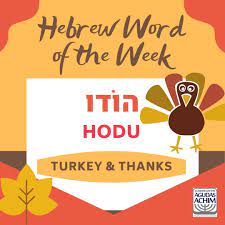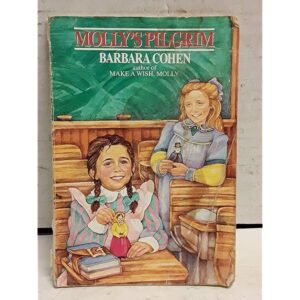 Did you know that the Hebrew word hodu, means both turkey and give thanks. So hodu for hodu.
Did you know that the Hebrew word hodu, means both turkey and give thanks. So hodu for hodu.
In Yiddish the word for turkey is indik which is related to India perhaps because the explorers thought that they had reached the East Indies.
Many of the Jewish immigrants from Europe at the end of the 19th and into the 20th century were reluctant to celebrate Thanksgiving with its strange foods (like turkey) and semi-Christian origins. Because Jews are forbidden to participate in the customs of other religions, they often consulted with their rabbis to get permission to celebrate the holiday but still served traditional Jewish celebratory side dishes like kugel.
 According to Molly’s Pilgrim by New Jersey author Barbara Cohen, the Pilgrims based their celebration of Thanksgiving on the Jewish holiday of Sukkot. Molly’s Pilgrim, an award winning short novel set in the early 1900s, tells the story of Molly and her Russian immigrant family. With contemporary themes such as immigration, bullying, mean girls, and acceptance, the book is a good choice for elementary school readers. There is also a video adaptation of the story where the setting is the 1970s during the beginning of the modern Russian migration to the United States.
According to Molly’s Pilgrim by New Jersey author Barbara Cohen, the Pilgrims based their celebration of Thanksgiving on the Jewish holiday of Sukkot. Molly’s Pilgrim, an award winning short novel set in the early 1900s, tells the story of Molly and her Russian immigrant family. With contemporary themes such as immigration, bullying, mean girls, and acceptance, the book is a good choice for elementary school readers. There is also a video adaptation of the story where the setting is the 1970s during the beginning of the modern Russian migration to the United States.
A final thought for the day: as Molly’s mother says in Molly’s Pilgrim, we -or our ancestors – are all Pilgrims, people who have left another place to seek freedom.
- Not By Brains Alone - Thu, Jul 18, 2024
- Kudos to the Lampert Library - Thu, Jun 27, 2024
- Dairy Dishes Not Just for Shavuot - Fri, Jun 14, 2024
